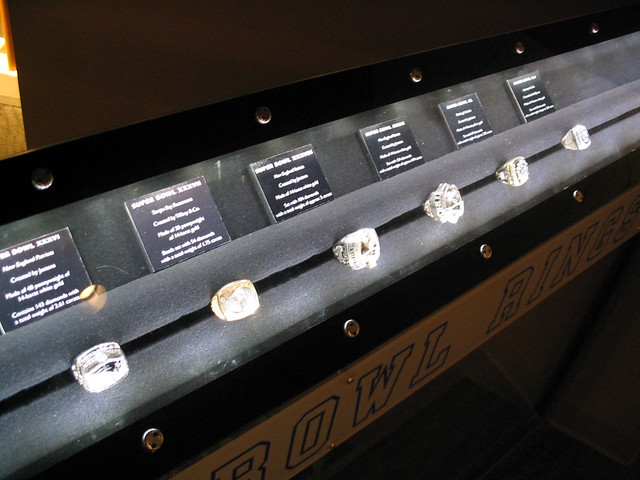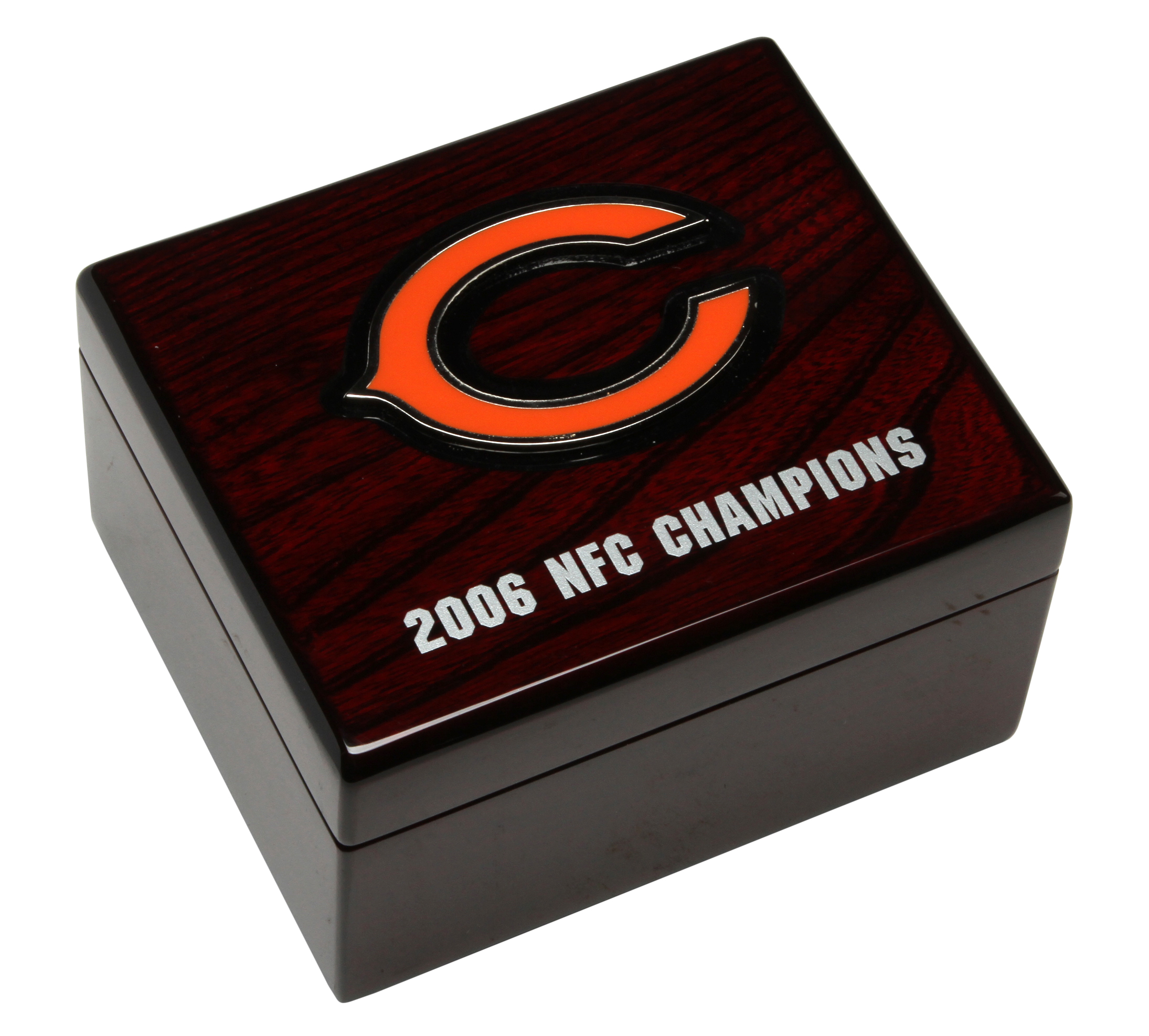
Image courtesy of marada's Flickr page - Pro Football Hall of Fame: https://www.flickr.com/photos/marada/18349271420/in/photolist-s9jx2h-6WanDm-88EBAf-88EBFW-6Wakz7-6WamJ3-6WavG5-6Wapgd-7AA2Cj-eZaZFx-tXsP7C-ucHyh9-5V94An-8qJEgH-744DSK-ofEBCj-7ZjcnY-4qX6xk
Super Bowl XLI - Indianapolis Colts 29, Chicago Bears 17. Played on February 4, 2007 at Dolphin Stadium, Miami, Florida. MVP Peyton Manning. Favorite Colts by 7. National anthem Billy Joel, ASL performed by Marlee Matlin. Halftime show Prince and the Florida A&M University Marching 100. Attendance 74,513. Network CBS. Announcers Jim Nantz and Phil Simms. Nielsen ratings 42.6. est. 93.2 million viewers. Market share 64. Cost of 30-second commercial US $2.6 million.
This was a surprisingly good Super Bowl. I had expected the Colts to dominate, and even though they won it convincingly enough, it nonetheless was a well-played Super Bowl, where both teams showed much of what got them to the big game in the first place.
Chicago scored on the first play of the game, earlier than any other team in Super Bowl history had, as Devin Hester broke free. The Bears went on and controlled the game early with a 14-6 lead in the first quarter.
The Colts, however, began to take over in the second quarter, scoring 10 points and going into the locker room with a 16-14 lead. They expanded that with the foot of Adam Vinatieri (yes, the former placekicker for the Colts archrivals, the New England Patriots). They built a 22-14 lead, but the Bears were able to cut it to 22-17 with a field goal of their own.
What ultimately decided this one was the interception of Rex Grossman which was returned for a touchdown by Kelvin Hayden of the Colts, giving Indy a 29-17 lead relatively early in the final quarter. The Colts were able to make it stand up, and that wound up being the final score, as the Colts won the second Super Bowl title of their franchise history (Super Bowl V being the previous time), and Peyton Manning finally earned his Super Bowl ring with Indianapolis.
One thing that made this Super Bowl stand out was the rainy weather. It simply poured all game long, making this the first Super Bowl played in very bad weather. Still, somehow, the Colts and Bears were able to make this a reasonably entertaining game.
Personal Memories: Lost a lot of weight starting Super Bowl week. It was the beginning of a year in which I would lose a tremendous amount of weight - over 40 pounds within the span of months. I felt great physically and mentally, although underneath the surface, my marriage was beginning to crack with a crisis this year, followed by another the next year, and these were the beginning of the end of that relationship.
Here are some of the major events that took place in 2006, the year this Super Bowl was played. The world's population was 6.7 billion people. Romania and Bulgaria join the European Union, bringing the number of member nations to 27 (Jan. 1). Leaders of Hamas and Fatah, two rival Palestinian factions, meet in Mecca and reach a deal to end hostilities and form a unity government (Feb. 7). The Palestinian legislature approves a Hamas-dominated unity government (March 17). Hamas takes control of much of the Gaza Strip (June 13). Palestinian president Mahmoud Abbas dissolves the government, fires Prime Minister Ismail Haniya, the leader of Hamas, and declares a state of emergency (June 14). The U.S. begins its "surge" of some 30,000 troops to Iraq to stem increasingly deadly attacks by insurgents and militias (Feb. 7). The International Court of Justice rules that the slaughter of some 8,000 Bosnian Muslims by Bosnian Serbs in Srebrenica in 1995 was genocide (Feb. 26). David Hicks, an Australian, pleads guilty to providing material support to al Qaeda. He's the first Guantánamo Bay detainee to be convicted by a military commission (March 26). Iranian troops detain 15 Britons (eight sailors and seven marines) claiming they were in Iranian territorial waters (March 26). The detainees are freed (April 4). Gerry Adams, the leader of Sinn Fein, and Rev. Ian Paisley, the head of the Democratic Unionist Party, meet face-to-face for the first time and hash out an agreement for a power-sharing government (March 26). Ukrainian president Viktor Yushchenko dissolves Parliament and accuses Prime Minister Viktor Yanukovich of attempting to consolidate power (April 2). President Vladimir Putin announces Russia will suspend the 1990 Conventional Armed Forces in Europe Treaty, which limits conventional weapons in Europe (April 26). In the second round of French presidential elections, Conservative candidate Nicolas Sarkozy defeats Socialist candidate Ségolène Royal, 53.1% to 46.9% (May 6). A commission that investigated 2006's war between Israel and Lebanon says Israeli prime minister Ehud Olmert was responsible for "a severe failure in exercising judgment, responsibility, and prudence." It also says Olmert rushed to war without an adequate plan (April 30). Gordon Brown replaces Tony Blair as the prime minister of Great Britain (June 27). Russian president Vladimir Putin announces that the country will suspend its participation in the Conventional Forces in Europe Treaty, a cold-war era agreement that limits the deployment of heavy weaponry (July 14). India and U.S. reach an accord on civilian nuclear power that allows India, which has not signed the Nuclear Nonproliferation Treaty, to buy nuclear fuel from the U.S. to expand its civilian nuclear energy program and reprocess its spent fuel (July 27). President Ramos-Horta names independence activist Xanana Gusmão as prime minister of East Timor (Aug. 6). Two pairs of truck bombs explode about five miles apart in the remote, northwestern Iraqi towns of Qahtaniya and Jazeera, killing at least 500 members of the minority Yazidi community, making it the single deadliest insurgent attack of the war (Aug. 14). Abdullah Gul, of the Justice and Development Party, is elected president of Turkey in the third round of voting by the country's parliament. He is the first Islamist president in the country's modern history (Aug. 28). Japanese prime minister Shinzo Abe abruptly announces his resignation. The move follows a string of scandals and his party's recent defeat in parliamentary elections, in which his Liberal Democratic Party lost control of the upper house to the opposition Democratic Party (Sep. 12). Yasuo Fukuda is elected prime minister of Japan (Sep. 23). Seventeen Iraqi civilians are killed when employees of private security company Blackwater USA reportedly fire on a car that failed to stop at the request of a police officer (Sep. 16). The House Committee on Oversight and Government Reform finds that employees of Blackwater USA have been involved in some 200 shootings in Iraq. The report says the company paid some families of victims and tried to cover up other incidents (Oct. 1). The State Department announces that its own monitors will accompany Blackwater employees on all security convoys (Oct. 5). An FBI report says 14 of the 17 shootings were unjustified and the guards were reckless in their use of deadly force (Nov. 13). Nuon Chea, who was second-in-command to Pol Pot during the four years of Khmer Rouge rule that led to the state-sponsored massacre of between 1 million and 2 million Cambodians, is arrested and charged with war crimes (Sep. 19). After a month of peaceful pro-democracy demonstrations that include hundreds of monks, Burmese government forces shoot at crowds, raid pagodas, and arrest monks. Dozens of people are killed. The protests are the largest in Myanmar in 20 years (Sep. 26) In a landmark deal, North Korea agrees to disclose details about its nuclear facilities, including how much plutonium it has produced, and dismantle all of its nuclear facilities by the end of 2007. In exchange, the country will receive some 950,000 metric tons of fuel oil or financial aid. The Bush administration will also start the process of removing North Korea from its list of nations that sponsor terrorism (Oct. 1). Pakistani president Pervez Musharraf is easily reelected to a third term by the country's national and provincial assemblies. The opposition boycotts the vote, however, and only representatives from the governing party participate in the election (Oct. 6). Former Pakistani prime minister Benazir Bhutto arrives in Pakistan after eight years in exile (Oct. 18). Musharraf declares a state of emergency, suspends the country's constitution and fires Chief Justice Iflikhar Muhammad Chaudhry and the other judges on the Supreme Court (Nov. 3). The Supreme Court, filled with judges loyal to Musharraf, dismisses the case challenging the constitutionality of Musharraf being elected president while head of the military (Nov. 22). Former prime minister Nawaz Sharif returns to Pakistan after eight years in exile and demands that Musharraf lift the emergency rule and reinstate the dismissed Supreme Court justices (Nov. 25). Musharraf steps down as military chief. He is replaced by Gen. Ashfaq Parvez Kayani (Nov. 28). Musharraf is sworn in as a civilian president (Nov. 29). Former Pakistani prime minister Benazir Bhutto is killed in a bombing at a campaign rally in Rawalpindi (Dec. 27). Cristina Fernández de Kirchner is elected Argentina's first woman president. She succeeds her husband, Néstor Kirchner (Oct. 28). Australian prime minister John Howard loses to the Labor Party's Kevin Rudd (Nov. 24). A National Intelligence Estimate says "with high confidence" that Iran froze its nuclear weapons program in 2003. The report contradicts one written in 2005 that stated Iran was determined to continue developing such weapons (Dec. 3). The African National Congress chooses Jacob Zuma as its leader, ousting South African president Thabo Mbeki (Dec. 18). Violence breaks out between rival tribes after preliminary results in Kenya's presidential elections show opposition candidate Raila Odinga, of the Orange Democratic Movement, defeating incumbent Mwai Kibaki, 57% to 39% (Dec. 27).
http://boards.sportslogos.net/topic/98529-super-bowl-field-database-sb-xlvi-texture-added-122215/page-9
Super Bowl XL logo and team helmets:
Super Bowl Rings:

Image courtesy of Ryan Schreiber Flickr page - Super Bowl rings: https://www.flickr.com/photos/ryanschreiber/2966914635/in/photolist-9fhtR7-mTUuPg-7BfrrT-8VABVJ-71329o-dkVSiW-713aji-716t8C-6ZY2fn-aaJzti-bSQYxn-8qJEPk-caGaTw-7s88nt-4qr4K5-gvvHpq-bZ7QUG-5wbdmB-qJWkZK-9TA5tc-712koy-679ZUN-hkLnBw-712XU1-716sLj-712Zih-712YYw-6ZY1P4-712Ys5-6ZXY5z-7131DJ-713g7L-6ZYeHM-6ZYdeF-6ZYdPe-6ZYgjz-6ZYedK-7139TJ-7124Do-9fE3N7-a3dxxG-716YLQ-6ZYbrr-6ZYfMi-6ZYcBx-7138ew-713aSy-dBNXDK-713ehv-46Wiar

No comments:
Post a Comment